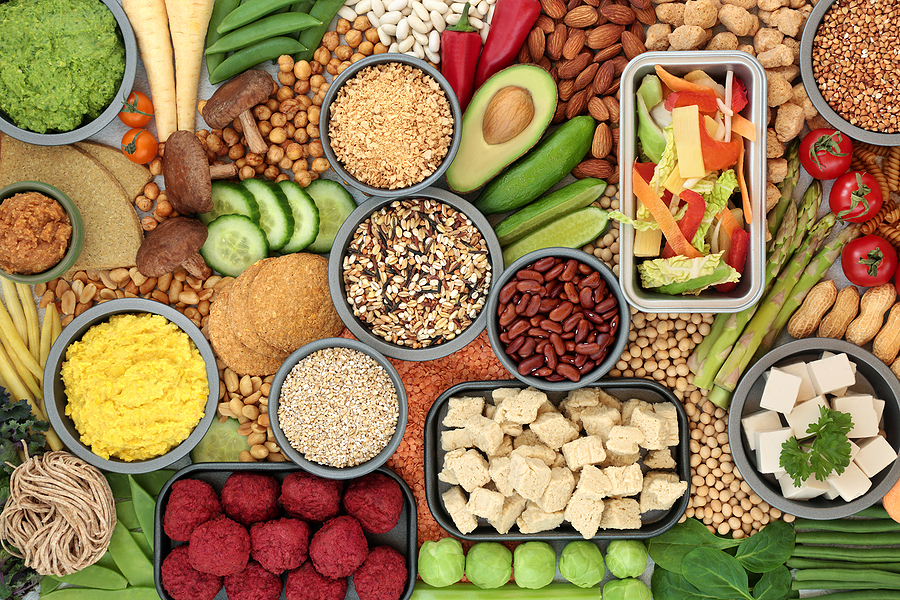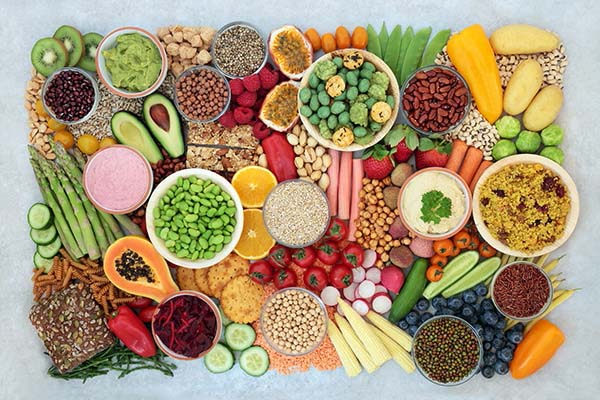Why Sugar Free Sauces Are a Game-Changer for Your Plant-Based Pantry
Why Sugar Free Sauces Are a Game-Changer for Your Plant-Based Pantry
Blog Article
Everything About Healthy And Balanced Food: Advantages of Taking On Plant Based Alternatives
The conversation bordering plant-based diet plans has acquired substantial attention over the last few years. Many people are checking out the possible health benefits, nutritional advantages, and ecological effects related to these nutritional options. As individuals come to be a lot more familiar with their food's impact on health and sustainability, concerns develop regarding the practicalities of taking on such a way of living. What certain adjustments can one anticipate, and how might these options reshape not only individual health yet also the earth's future?
Recognizing Plant-Based Diets
Although lots of people link plant-based diet regimens mainly with vegetarianism or veganism, these diet regimens can encompass a large range of eating patterns that prioritize whole, minimally processed plant foods. Such diet plans frequently include fruits, vegetables, whole grains, seeds, nuts, and vegetables, while limiting or eliminating pet products. This flexibility allows people to customize their dietary choices according to individual preferences and nutritional demands. Some may take on a mostly plant-based diet while still periodically consuming meat or dairy products, typically referred to as a flexitarian technique. The focus remains on including even more plant foods, which can result in a varied variety of tastes and dishes. Understanding these different analyses of plant-based eating is vital for appreciating its availability and allure in modern food culture.
Health Conveniences of Plant-Based Foods
The wellness advantages of plant-based foods are considerable, offering a nutrient density advantage that supports overall wellness. Research study indicates that these foods can enhance heart health and wellness and play an essential role in effective weight administration. By integrating extra plant-based alternatives, people might boost their nutritional selections and advertise long-lasting health.
Nutrient Density Benefit
Nutrient thickness plays a crucial role in the health benefits of plant-based foods, making them an engaging option for those looking for a balanced diet plan. Plant-based foods, such as fruits, vegetables, beans, nuts, and whole grains, are commonly abundant in vital vitamins, minerals, and antioxidants while being reduced in calories. This high nutrient thickness enables individuals to eat less calories while still satisfying their nutritional demands. In addition, these foods are packed with nutritional fiber, advertising digestive system wellness and helping in weight monitoring. By incorporating nutrient-dense plant-based choices, consumers can boost their overall wellness, sustain their immune systems, and lower the risk of persistent illness. Ultimately, the nutrient thickness of plant-based foods highlights their importance in a health-conscious lifestyle.
Heart Wellness Improvement

Weight Monitoring Support
Along with advertising heart health and wellness, a plant-based diet can significantly assist in weight administration. This nutritional technique highlights entire foods such as fruits, vegetables, beans, nuts, and whole grains, which are normally lower in calories and higher in fiber contrasted to animal-based items. The high fiber material helps boost satiation, minimizing general calorie intake. Plant-based diet plans are usually rich in important nutrients while low in undesirable fats, making it less complicated to maintain a healthy and balanced weight. Research suggests that people that adopt a plant-based lifestyle have a tendency to have reduced body mass indexes (BMIs) and experience more successful fat burning compared to those that take in meat-heavy diet regimens. Consequently, embracing plant-based choices is a critical choice for effective weight administration
Nutritional Worth of Plant-Based Active Ingredients
Plant-based ingredients are rich in vital nutrients, providing a varied variety of vitamins, minerals, and anti-oxidants that add to total wellness. A contrast of healthy protein resources discloses that while pet products are usually seen as exceptional, numerous plant-based options provide sufficient protein and other helpful substances. Understanding the nutritional worth of these active ingredients can help people make notified dietary choices.
Essential Nutrients in Plants
Nutrient-rich ingredients found in plants offer a varied variety of important minerals and vitamins that contribute greatly to total health. These ingredients are rich in vitamins A, C, and K, which support immune function, vision, and blood clotting, respectively. Furthermore, plants give vital minerals such as calcium, potassium, and magnesium, vital for heart wellness, muscle mass feature, and bone stamina. The presence of fiber in plant-based foods help digestion and promotes a healthy and balanced gut microbiome. Anti-oxidants, discovered perfectly in veggies and fruits, assistance battle oxidative tension and reduce swelling. Moreover, several plant foods are reduced in calories yet high in nutrients, making them an content outstanding selection for those seeking to keep a healthy weight while ensuring excellent nutrient intake.
Comparing Healthy Protein Resources
Healthy protein sources vary considerably in their dietary accounts, with plant-based active ingredients supplying distinct advantages. Unlike animal proteins, which frequently contain hydrogenated fats and cholesterol, plant healthy proteins have a tendency to be lower in these harmful parts. Legumes, nuts, seeds, and whole grains are rich in crucial amino acids, fiber, vitamins, and minerals. For circumstances, lentils supply high protein web content along with considerable iron and folate, while quinoa is a complete healthy protein, providing all 9 vital amino acids. Furthermore, plant-based healthy proteins are commonly gone along with by anti-oxidants and phytochemicals that sustain total health. The change to plant-based protein resources not only boosts nutritional consumption but additionally aligns with lasting dietary methods, reducing ecological influence and promoting lasting health and wellness advantages.
Environmental Impact of Plant-Based Consuming
As awareness of climate adjustment grows, several people are discovering sustainable dietary options that can significantly reduce their ecological footprint. Plant-based eating has actually become a considerable factor to reducing greenhouse gas emissions, which are primarily connected with livestock manufacturing. The cultivation of fruits, veggies, legumes, and grains generally needs less sources, such as water and land, compared to pet farming. In addition, plant-based diets can result in reduced deforestation, as much less land is needed for grazing animals or expanding pet feed. By shifting towards plant-based choices, customers can sustain biodiversity and promote healthier environments. On the whole, welcoming plant-based consuming not just benefits individual wellness yet additionally represents an essential action towards ecological sustainability and preservation initiatives.
Conquering Common Misconceptions
While many individuals identify the advantages of a plant-based diet regimen, several why not try here misunderstandings commonly prevent them from completely accepting this way of life. A typical belief is that plant-based diet plans lack sufficient healthy protein; however, countless plant resources, such as vegetables, nuts, and tofu, offer sufficient protein. Additionally, some assume that this diet regimen is pricey, when as a matter of fact, staples like beans, rice, and seasonal vegetables can be fairly inexpensive. Another false impression is that plant-based eating is extremely restrictive, whereas it in fact offers a diverse selection of flavors and foods. Finally, several stress that a plant-based diet plan may bring about deficiencies, yet with proper planning, people can acquire all necessary nutrients, consisting of minerals and vitamins, while taking pleasure in a wide range of tasty meals.
Tips for Transitioning to a Plant-Based Lifestyle
Making the change to a plant-based way of life can be an enhancing experience, though it frequently needs some guidance to browse the first changes. People are encouraged to begin gradually, integrating more fruits, vegetables, vegetables, and whole grains into their meals while decreasing meat and milk consumption. Dish preparation is crucial; preparing a regular food selection can aid ease the modification and protect against final harmful options. Discovering cooking techniques and new dishes can additionally enhance the experience and maintain enjoyment regarding plant-based consuming. In addition, signing up with support teams or areas can provide inspiration and share valuable suggestions. Staying informed concerning nourishment warranties well balanced dishes, stopping shortages while cultivating a healthy and balanced, gratifying plant-based way of life.

Delicious Plant-Based Dish Ideas
Checking out tasty plant-based dish concepts can influence people to embrace a much more nutritious diet regimen. One popular option is a hearty quinoa salad, including cherry tomatoes, cucumber, and a zesty lemon-tahini clothing. An additional favorite is a mouthwatering lentil stew, loaded with carrots, celery, and fragrant herbs, best for a comforting dinner. For breakfast, over night oats made with almond milk, chia seeds, and covered with fresh berries provide a nutritious begin to the day. In addition, a vibrant vegetable stir-fry with tofu and a range of vibrant veggies can be a quick yet satisfying meal. Lastly, luscious avocado salute on whole-grain bread, sprinkled with flavors and seeds, uses a straightforward yet flavorful treat. These dishes display the variety and richness of plant-based eating.

Regularly Asked Concerns
Can a Plant-Based Diet Provide Enough Protein?
The inquiry of whether a plant-based diet plan can provide sufficient protein is usual. Many sources, consisting of vegetables, nuts, seeds, and whole grains, can meet healthy protein needs properly, supporting a well balanced and healthy diet regimen for individuals.
Are Plant-Based Diets Suitable for Kid?
The suitability of plant-based diet regimens for children relies on cautious planning. Appropriate nutrients should be assured, including vitamins, healthy proteins, and minerals. With appropriate advice, such diets can sustain healthy development and growth in kids.
Just how Do I Eat in restaurants on a Plant-Based Diet regimen?
Dining out on a plant-based diet plan entails seeking dining establishments with diverse menus, requesting for modifications, and exploring vegan-friendly alternatives. Preparation ahead and interacting nutritional preferences can improve the eating experience while keeping dietary options.
What Prevail Irritants in Plant-Based Foods?
Common allergens in plant-based foods include soy, gluten, nuts, and seeds - Plant Based Beef. Individuals adhering to a plant-based diet plan needs to be mindful of these allergens and read labels very carefully to avoid unfavorable reactions and ensure risk-free consumption
Can Plant-Based Diets Assist With Weight Loss?
Research indicates that adopting a plant-based diet may assist in fat burning as a result of its typically lower calorie density and greater fiber web content. This mix can boost satiation, aiding people handle their calorie consumption successfully. Lots of individuals associate plant-based diet regimens generally with vegetarianism or veganism, these diet regimens can include a large variety of consuming patterns that prioritize whole, minimally processed plant foods. Nutrient thickness plays a necessary duty in the health benefits of plant-based foods, making them an engaging option for those seeking a balanced diet plan. Plant-based diet plans have been revealed to substantially boost heart wellness, as they usually consist of aspects that support cardio function. In addition to promoting heart health, a plant-based diet regimen can substantially aid in weight management. A common idea is that plant-based diet plans do not have adequate protein; nonetheless, many plant sources, such as beans, nuts, and tofu, supply over at this website adequate healthy protein.
Report this page